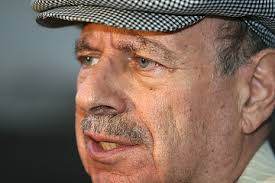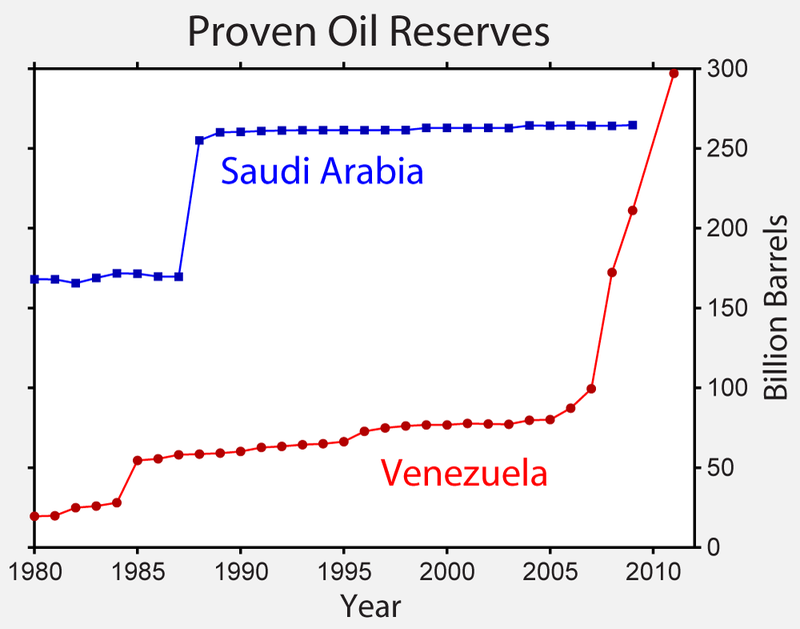www.aljazeerah.info
Opinion Editorials, May 2019
Archives
Mission & Name
Conflict Terminology
Editorials
Gaza Holocaust
Gulf War
Isdood
Islam
News
News Photos
Opinion Editorials
US Foreign Policy (Dr. El-Najjar's Articles)
www.aljazeerah.info
United States and Venezuela: A Historical Background Showing a Quest for Oil By James Petras Al-Jazeerah, CCUN, May 15, 2019 |
 |
 |
|
|
The proven oil reserves in Venezuela are recognized as the largest in the world, totaling 297 billion barrels |
“Venezuela has the
largest oil reserves in the world and they own it and we want it”
(Anonymous Trump official)
Introduction
US hostility and efforts to overthrow the Venezuelan government forms
parts of a
long and inglorious history of US intervention in Latin
America going back to the second
decade of the 19th century.
In 1823 US President Monroe declared, in his name, the ‘Monroe
Doctrine” – the
US right to keep Europeans out of the region, but
the right of the US to intervene in
pursuit of its economic,
political and military interests.
We will proceed to outline the historical phases of US political and
military
intervention on behalf of US corporate and banking
interests in the region and the Latin
American political and social
movements which opposed it.
The first period runs from the late 19th century to the 1930’s, and
includes Marine
invasions , the installation of US client
dictatorships and the resistance of popular
revolutions led by
several revolutionary leaders in El Salvador, (Farabundo Marti),
Nicaragua, (Augusto Sandino), Cuba (Jose Marti) and Mexico [Lazaro
Cárdenas].
We will then discuss the Post-WWII US interventions , the
overthrow of popular
governments and the repression of social
movements, including Guatemala (1954), Chile
coup (1973), US
invasion of the Dominican Republic (1965), Grenada (1982),and
Panama
(1989).
We will then exam US efforts to overthrow the Venezuela
government (1998 to
the present).
US Policy to Latin America: Democracy, Dictatorship and Social
Movements
US General Smedley Butler summarized his 33 years in the
military as a ‘muscle
man for Big Business, for Wall Street and the
bankers . . . I helped Mexico safe for
American oil interest in
1914. I helped make Haiti and Cuba a decent place for National
City
Bank, to collect revenue . . . I helped in the raping of half a dozen
Central American
republics for the benefit of Wall Street. I helped
purify Nicaragua for the . . . House of
Brown Brothers in 1902 –
1912. I brought a light to the Dominican Republic for the
American
sugar interest in 2016. I helped make Honduras right for American fruit
companies in 1903 . . . looking back on it, I could have given Al
Capone a few hints’!
During the first 40 years of the 20th century
the US invaded Cuba , converted it
into a quasi-colony and
repudiated its hero of independence Jose Marti; it provided
advisers
and military support to El Salvador’s dictator, assassinated its
revolutionary
leader Farabundo Marti and murdered 30,000 landless
peasants seeking land reform.
The US intervened in Nicaragua, fought against its patriotic leader
Augusto Sandino and
installed a dictatorial dynasty led by the
Somoza regime until it was overthrown in 1979.
The US intervened in
Cuba to install a military dictatorship in 1933 to suppress an
uprising of sugar workers .Between 1952 – 1958 Washington armed the
Batista
dictatorship to destroy the revolutionary July 26 Movement
led by Fidel Castro. In the
late 1930s the US threatened to invade
Mexico when President Lazaro Cardenas
nationalized the US oil
companies and redistributed land to millions of landless peasants.
With the defeat of fascism (1941-45), there was an upsurge of social
democratic
governments in Latin America.But the US objected. In 1954
the US overthrew the
elected Guatemala president Jacobo Arbenz for
expropriating the banana plantations of
United Fruit Company. It
backed a military coup in Brazil in 1964, the military remained
in
power for 20 years. In 1963 the US overthrew the Dominican Republic’s
democratically elected government of Juan Bosch and invaded in 1965
to prevent a
popular uprising . In 1973 the US supported a military
coup overthrowing democratic
socialist president Salvador Allende
and backed the military regime of General Augusto
Pinochet for
nearly 20 years. Subsequently, the US intervened and occupied Grenada in
1983 and Panama in 1989.
US propped up rightwing regimes throughout the region which backed US
banking and corporate oligarchs which exploited resources, workers
and peasants.
But by the early 1990’s powerful social movements led
by workers, peasants,
middle class public employees/doctors and
teachers challenged the alliance of domestic
and US elite rulers. In
Brazil the 300,000 strong rural workers movement (MST)
succeeded in
expropriating large fallow estates; in Bolivia indigenous miners and
peasants including coca farmers overthrew the oligarchy. In Argentina
general strikes
and mass movements of unemployed workers overthrew
corrupt rulers allied with City
Bank. The success of the popular
nationalist and populist movements led to democratic
elections won
by progressive and leftist Presidents throughout Latin America,
especially
Venezuela.
Venezuela: Democratic Election, Social Reforms and the
Election of President
Chavez
In 1989 the US backed President of Venezuela imposed austerity
programs that
provoked popular demonstrations which led to the
government ordering the police and
military to repress the
demonstraters: several thousand were killed and wounded. Hugo
Chavez, a military official, rebelled and supported the populer
uprising.He was captured,
arrested, later freed and ran for
presidential office.. He was elected by a wide margin in
1999 on a
program of social reforms, economic nationalism, an end of corruption
and
political independence.
Washington began a hostile campaign to pressure President Chavez to
accept
Washington’s (President Bush) global war agenda in
Afghanistan and around the world.
Chavez refused to submit. He
declared, “You don’t fight terror with terror”. By late
2001 the US
Ambassador met with the business elite and a sector of the military to
oust
President elect Chavez via a coup in April 2002. The coup
lasted 24 hours ..Over a
million people, mostly slum dwellers,
marched to the Presidential palace, backed by
military loyalists
.They defeated the coup and restored President Chavez to power. He
proceeded to win a dozen democratic elections and referendums over the
following
decade. President Chavez succeeded in large part because
of his comprehensive program
of socio-economic reforms favoring the
workers, unemployed and middle class.
Over 2 million houses and
apartments were built and distributed free to the
popular classes;
hundreds of clinics and hospitals provided free health care in the
populer
neighborhoods; universities, training schools and medical
centers for low income
students were built with free tuition.
Thousands in neighborhood community centers and ‘local collectives’
discussed
and voted on social and political issues – including
criticism and recall of local
politicians, even elected Chavez’
officials.
Between 1998 and 2012, President Chavez won four straight
Presidential
elections,several congressional majorities and two
national referendums, garnering
between 56% and over 60% of the
popular vote.After Chavez died President Maduro
won elections in
2013 and 2018 but by a narrower margin. Democracy flourished,
elections were free and open to all parties.
As a result of the inability of US backed candidates to win
elections, Washington
resorted to violent street riots,and appealed
to the military to revolt and reverse the
electoral results. The US
applied sanctions beginning with President Obama and deepen
with
President Trump. The US seized billions of dollars in Venezuelan assets,
and oil
refineries in the US. The US selected a (non-elected) new
President (Guaido) who was
directed to subvert the military to
revolt and seize power.
They failed: about one hundred soldiers out of 267,000 and a few
thousand
rightwing supporters heeded the call. The “opposition”
revolt was a failure.
US failures were predictable as the mass of
voter defended their socio-economic
gains; their control of local
power; their dignity and respect. Over 80% of the population
including the majority of the opposition – rejected a US invasion.
US
sanctions contributed to hyper-inflation and the death of 40,000
Venezuelan
citizens due to the scarcity of medical products.
Conclusion
The US and the CIA followed in the footsteps of the past century
seeking to
overthrow the Venezuelan government and seize control of
its oil and mineral resources.
As in the past the US sought to impose a submissive dictatorship
which would repress the
popular movements and subvert the democratic
electoral processes. Washington sought
to impose an electoral
apparatus which would ensure the election of submissive rulers as it
did in the past and as it has done in recent times in Paraguay, Brazil,
and Honduras.
So far Washington has failed, in great part because of the peoples’
defense of
their historical gains. Most poor and working people are
aware that a US invasion and
occupation will lead to mass killing
and the destruction of sovereignty and dignity.
The people are aware of US aggression as well as the mistakes of the
government.They are demanding corrections and rectifications .The
government of
President Maduro favors a dialogue with the
non-violent opposition; Venezuelans are
developing economic ties
with Russia, China, Iran, Turkey, Bolivia, Mexico and other
independent countries.
Latin America has experienced decades of
US exploitation and domination; but it
has also created a history of
successful popular resistance including revolutions in
Mexico,
Bolivia and Cuba; successful social movements and voting outcomes in
recent
years in Brazil, Argentina, Ecuador and Venezuela.
President Trump and his murderous cohort of Pompeo, Bolton, and
Abrams have
declared war against the Venezuelan people but they have
thus far been defeated.
The struggle continues.
***
Share the link of this article with your facebook friends
|
|
|
|
||
|
||||||


